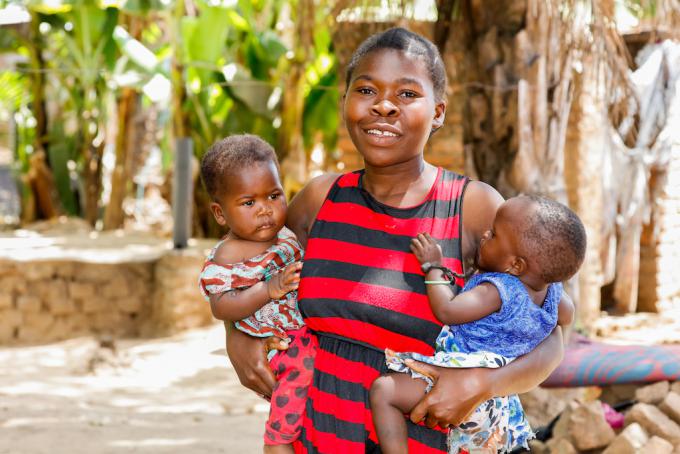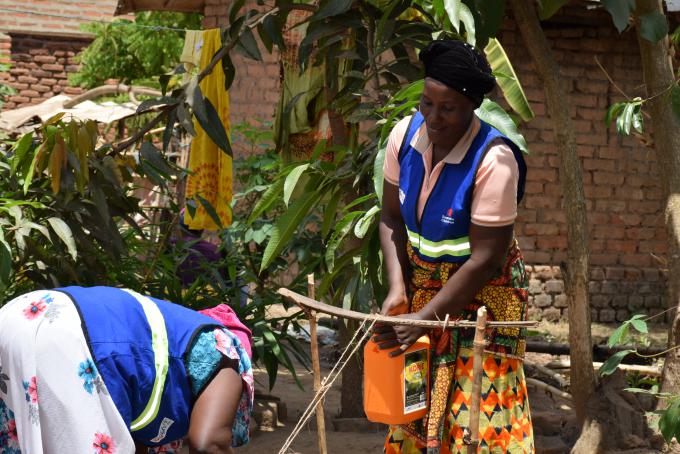How ‘Lishe Endelevu - Sustainable nutrition project impacted the lives of People in Morogoro during Covid-19 pandemic!

At the beginning of 2020, plans by Save the Children to continue with the expansion and implementation of the 'Lishe Endelevu' (Sustainable nutrition) project in Morogoro region got off to a good start. By this time, other countries, including China, had reports of a newly deadly Covid-19 virus pandemic, and on March 16, 2020, Tanzania reported the first case of the virus.
Suddenly, everyone across the country panicked as the government, through the health ministry, began to come up with plans for how Tanzania’s people could survive. Public gatherings were banned, after a few days all learning institutions were also closed, and everything that seemed to be able to further spread the disease was restricted.
This, for residents of Ifakara municipality and other areas where the Sustainable Nutrition project is being implemented, was a blow as the project now required an alternative and safer way to sustain its activities.
Given that at this time more information about Covid-19 and how to prevent further transmission was needed, the project implementers had no choice but to support the government's efforts as well as the World Health Organization to provide such education focusing on project areas.
According to the Lishe Endelevu Activity annual report of October 2019 to September 2020, Save the Children Tanzania, in collaboration with Regional Health Management Team Morogoro, conducted 11 day campaign using two teams that aimed at creating mass awareness on prevention of covid-19 to all nine Councils of Morogoro Region.
“This awareness campaign involved visiting the markets and high population strategic areas. The team distributed leaflets with key messages on how to fight against covid-19 in the community using Community Health Workers (CHWs) as an agent to cascade the messages downwards to household level,” reads part of the report.
Through this activity, as per the report, Morogoro team distributed 1, 643 leaflets in all nine councils and affixed Covid-19 posters in strategic areas with mass gatherings like Business centers, Churches and mosque buildings. Further, public and private institutions like schools, health facilities, and Ward Executive Offices (WEO) and Village Executive Offices (VEO) had posters affixed so that they could gain more knowledge and continue spreading it to their communities.
“In fact, we were very scared, and the community was shocked because they did not have any education about the tragedy, so we could not do anything at this time," says Amina Idi Uhwangi, one of the CHWs.
However, Ms Uhwangi says they were encouraged by the education provided by experts through Save the Children, where they regained hope. Following the training, they extended the education to their fellow community members.
“The sustainable nutrition project had to stop for a while because at first people were afraid of us. But after being educated then people knew how to protect themselves from the infection, and little by little people began to see hope,” she explained.
Ms Uhwangi, says that whenever they were encouraging mothers to continue with the nutrition movement they were afraid, so the mobilizers would have to start teaching them how to adhere to hygiene to avoid Covid-19.
"All of those whom our team reached out, gained a great deal of understanding about the epidemic and we continued to spread that knowledge further," she reveals.
She goes on to say that despite the disease affecting the education of many children in those villages, especially those who could not access online learning, parents were afraid to go to the clinic.
“Another challenge was that parents and pregnant women were afraid to go to clinics and hospitals; this scared us a lot at first but after educating them they responded well," says Ms Uhwangi, adding that if it were not for the sponsors of the sustainable nutrition project, they would not be able to help their fellow community members.
For her part, one of the 265 leading women were trained by the project to inspire and create awareness on nutrition, says Covid-19 education is what got them back on track.
“The community members were very nervous until we educated them so that everyone understood, although the economic situation for women with their income-generating projects dropped significantly” reveals Ms Moshi Mgokeli, a resident of Mbasa ward. “For example, we used to make a profit of up to 20, 000 Tshs before Covid-19, but after this pandemic it dropped to 5, 000 Tshs. This hurt us a lot but because most of us were aware of good nutrition, our families continued to develop immunity,” she adds.
Joyce Njowere says she was scared even to go out of her house to attend the clinic. She had not taken her one-and-a-half-year-old son to the clinic out of fear. “Every time I listened to the news bulletin, I found myself so scared. We were lucky because the CHW members through this project did not give up as they provided education which helped us a lot," she says.
What reports further reveal
The region’s annual report also reveals that a total of 456 villages were reached with key messages regarding Covid-19 awareness and prevention techniques.
“Through the campaign exercise, we managed to reach 132,704 households with a total of 402,042 members (220,160 Female, 181,882 Male),” reads part of the report.
The beneficiaries of Lishe Endelevu Activity (pregnant women, lactating women and under-five children) were the key focus on this campaign to ensure that they are prevented from the covid-19 disaster, says the report.
“So, we managed to reach 12,833 pregnant women, 49,372 lactating mothers 57,588 under-five children whereby 52,116 were under-two-year-old children with specific covid-19 preventive messages,” the annual report further tells.
Further, the effects of Covid-19 did not only affect Morogoro region’s Sustainable Nutrition progress alone as the national annual report also shows the impact that the disease had on Save the Children’s activities.
Save the Children’s national annual report (2019/2020) says that even after the announcement was made by the government indicating that there is no Covid-19 in the country and that individuals should resume business as usual, pregnant mothers, lactating mothers and households with children under-five were not willing to go to the health facilities.
“Overall, the participation in antenatal (ANC), postnatal (PNC) and under-five clinics declined for almost 6 months,” it reveals.
The report says that 37 percent of children under two (0-23 months) were reached with community-level nutrition interventions through Lishe Endelevu program.
“Achievement of this indicator depends on the functionality and activeness of community interventions such as support groups, which was severely impacted by the Covid-19 pandemic where mass gatherings were restricted as a precaution measure to avoid Covid-19 pandemic transmission. Forty-one percent of adolescents (15-19) were reached with nutrition-sensitive interventions through USG-supported programs i.e Save the Children-Lishe Endelevu program.”
“The approval of adolescent nutrition Social and Behaviors Change Communication (SBCC) materials was delayed due to Covid-19 pandemic which affected the timelines of validation workshops and orientations of teachers and CHWS/CHVs to roll out nutrition and Water, Sanitation and Hygiene (WASH) education sessions among adolescents,” reads the report.
However, the report says despite the outbreak of the Covid-19 pandemic, Lishe Endelevu’s adaptation mechanism enabled the Activity to continue implementation that contributed to overall achievement and performance progress.

One of the beneficiaries' husbands, Joseph Masanja, says that at first, he did not want his wife to go out to attend nutrition training due to fear of contracting Covid-19.
“After remembering how our children's health improved due to my wife having been enlightened, I had to let her go and now I can't stop her because the benefits of this project are evident," he explains.
Ward Executive Officers (WEO) and Nutritionist
Michenga ward executive officer Mr Philip Komba says despite the existence of Covid-19 restrictions, Sustainable Nutrition implementers did not leave the community but continued to provide education on how to avoid further spread of the disease.
“In fact, Save the Children helped us a lot. They cooperated so much where they provided education to our people and we are still witnessing their contribution in improving the health of the residents of Michenga ward, in Ifakara municipality,” explains Mr Komba.
However, Mr Komba took the opportunity to explain that prior to Covid-19 and hygiene education, the residents of the area did not pay much attention to hand hygiene, thus calling on the community to adhere to the education they have received on hygiene through WASH.
“Hygiene goes hand in hand with nutrition. So, let me ask our people to continue focusing on hygiene as, even if it is not Covid-19, other diseases exist and are dangerous as well. This opportunity they have received through you (Sustainable Nutrition) should not be neglected," Mr Komba says.
For her part Winie White, who is a Project Nutritionist says that due to the possibility of a second wave of Covid-19, as people were no longer following the preventive measures, education should continue.
“Education should continue being provided and the notion that Covid-19 is over should be eradicated. Elsewhere we still see this disease exists because they provide statistics, but while the data is not there on our side, let's not forget about hygiene and continue to take precautions," she advises.
END.
 Tanzania
Tanzania